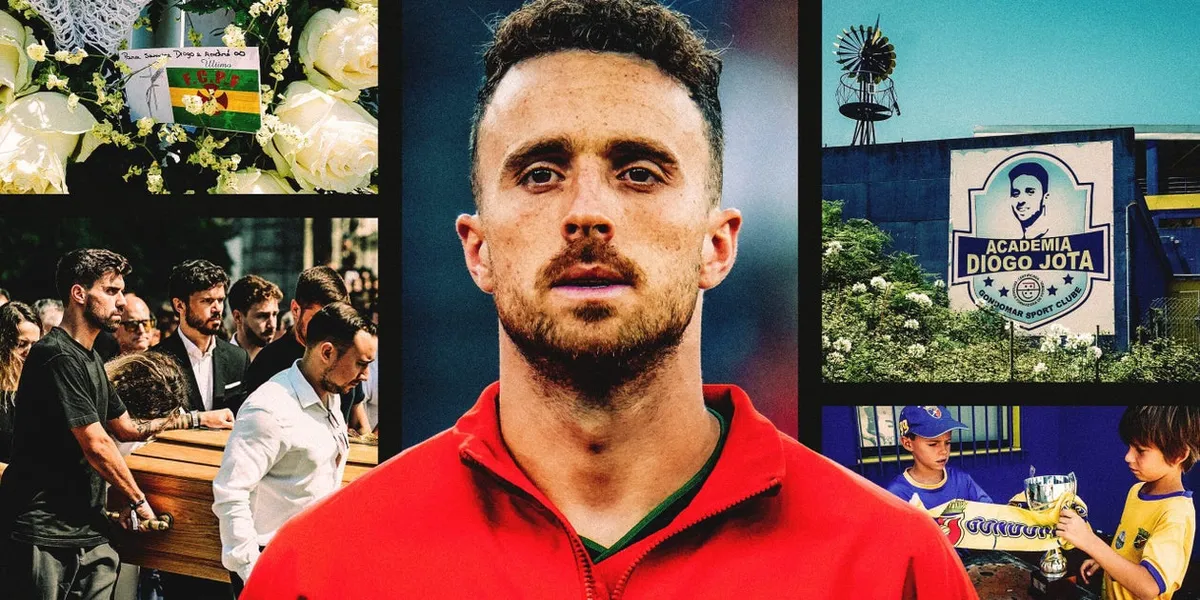
As the clock approached midday, the dedicated first-team players at FC Paços de Ferreira were immersed in their pre-season training routines. They jogged under the intense sun, demonstrating their determination and commitment. After an hour of rigorous exercise, the players exited the field in small groups, seeking refreshment and shade to recover. It appeared to be just another typical day of pre-season training. However, a somber scene unfolded just around the corner on Rua do Estádio, where the club's flag flew at half-mast. An electronic billboard above the west stand displayed a poignant message alongside a photo of the late Diogo Jota: “Forever.”
Inside the main stand, the aging first-team changing room featured a distinctive green and white checkerboard floor, with wooden lockers that had seen better days. It was here, in October 2014, that Jota donned the yellow jersey of Paços for his first match in senior football. His eventual transfer to Atlético Madrid in 2016 provided the club with a financial windfall, leading to the construction of a new eastern stand, now referred to as the Diogo Jota Stand. Paulo Gonçalves, the club's long-serving technical secretary, reminisced about Jota’s early days, pointing to the far end of the pitch where he scored his first goal and the tribune where he joyfully embraced his mother after that moment.
Although Jota played only 45 matches for Paços, his journey from a modest club to football stardom did not sever his ties with his roots. His profound gratitude towards Paços for believing in him when bigger clubs overlooked him kept him connected to the club. He acted as a ‘godfather’ to youth players during a summer tournament last year, offering advice and support from a distance. “He was always in touch, always sending us messages,” Gonçalves said, his voice filled with emotion. “Especially in difficult moments.”
The tragic deaths of Diogo Jota and his brother, André Silva, have elicited an outpouring of stories that reflect his kindness, humanity, and heart. Tales of his decency emerged from Liverpool, Wolverhampton, and many other places. However, the regional significance of this tragedy resonated deeply in the north of Portugal, where Jota was born and raised. His roots in Porto and Gondomar, where he played for a local team, were evident. His grandfather still resides in Gondomar, and the close-knit community is united in mourning the loss of two beloved sons.
Vitor Borges, a taxi driver who worked alongside Jota's mother at a local car factory, expressed the collective sorrow: “Her and her husband overcame a lot to raise those boys. All of it is gone, just like that. No one deserves this, but least of all her.” Former neighbor Miguel Pereira shared precious memories of Jota, recalling playful kick-arounds at their childhood court. As he honored Jota, he brought a photo of his son Vasco with Jota, taken just a year prior. Vasco and his cousin recently claimed victory in their local league, and they paid tribute by laying down a replica trophy adorned with a Gondomar scarf.
The academy of Gondomar SC has been named after Jota, with his image proudly displayed on the main stand. This past Friday afternoon, the club transformed into a temporary shrine, overflowing with flowers, candles, jerseys, and heartfelt messages. Fans and locals gathered, paying homage with tributes such as “You will always be our hero” and “Diogo and André, forever sons of this land.” The training pitch, where Jota honed his skills from 2005 to 2013, stood as a silent witness to his journey from a young boy to a football luminary.
As the community gathered to pay their respects, people from all walks of life arrived, including supporters from FC Porto and Liverpool. Pedro Figueiredo, a Porto fan, remarked, “He played for my club, and I admired him a lot. He came from nothing and worked immensely hard.” Eugenia Dias and her granddaughter, Bernadita, laid a flower in tribute, echoing the sentiment of many who felt a deep connection to Jota: “Diogo was an idol to the people of Gondomar.”
Gondomar, known as Portugal’s goldsmith capital, resonates with the idea that Jota was not just a jewel in the world of football but a testament to hard work and perseverance. Maria Nogueira, a local resident, summarized the community's feelings: “He was a humble man, someone who fought for everything he had in his life. He was a symbol of the region.”
As the public wake commenced, a large crowd gathered outside the Matriz de Gondomar church, where people waited in line to pay their respects. They shared stories, exchanged condolences, and expressed their grief over the senseless loss of Jota and his brother. The emotional scene inside the chapel revealed the depth of sorrow felt by family and friends, including Jota’s parents and widow, Rute Cardoso. The church bells rang at 5 pm, marking a moment of silence as more mourners arrived, creating a long line that wrapped around the cemetery.
The following day, Jota's funeral drew even more attendees, including a delegation from Liverpool and several of his Portugal teammates. The event highlighted the global impact of Jota’s life and career, showcasing the extensive reach of his legacy. Even amid the grief, the community of Gondomar and the football world at large found solace in the shared memories of a man who nourished his roots and cherished his community.
As locals paid tribute, a poignant note read, “Thank you, Diogo, for making so many people happy.” For the family left behind, the journey through grief continues, but the gratitude for the time shared with Jota, along with the joy he brought to countless lives, will remain forever etched in their hearts.